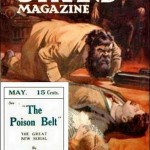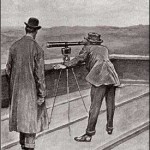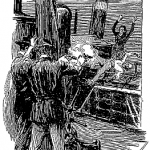“‘Fifty carats if it’s one,’ cried another, weighing it in the palm of his hand.
“I had my scales with me, so I offered to weigh it. It was sixty-four and a half carats. Then they washed it and examined it. There was a lot of whispering among them and then the one who had found it came forward.
“‘You deal, don’t you, Mr. Girdlestone?’ he said.
“‘Now and then,’ I answered, ‘but I’m not very keen about it. I came out here more for pleasure than business.
“‘Well,’ he said, ‘you may go far before you see a finer stone than this. What will you bid for it?’
“I looked at it. ‘It’s off-coloured,’ I said.
“‘It’s white,’ said he and one or two of his chums.
“‘Gentlemen,’ I said, ‘it is not white. There are two shades of yellow in it. It is worth little or nothing.’
“‘Why, if it is yellow it makes it all the more valuable,’ said a big fellow with a black beard and corduroy trousers. ‘A yellow stone’s as good as a white.’
“‘Yes,’ I answered, ‘a pure yellow stone is. But this is neither one nor the other. It’s off-colour, and you know that as well as I.’
“‘Won’t you bid for it, then?’ said one of them.
“‘I’ll bid seventy pounds,’ I said, ‘but not a penny more.’
“You should have heard the howl they all set up. ‘It’s worth five hundred,’ the fellow cried.
“‘All right,’ I said, ‘keep it and sell it for that; good day,’ and I went off. The stone was sent after me that evening with a request for my cheque, and I sold it for a hundred two days afterwards.[1] You see old Van Harmer’s training has come in very handy. I just tell you this little anecdote to let you see that though I’m new in the work I’m not to be done. Nothing in the papers here from Russia. I am ready, come when it may. What would you do if there should be any hitch and the affair did not come off? Would you cut and run, or would you stand by your colours and pay a shilling or so in the pound? The more I think of it the more I curse your insanity in getting us into such a mess. Good-bye.”
“He is right. It was insanity,” said the old merchant leaning his head upon his hands. “It seems unkind of the lad to say so when he is so far away, but he was always plain and blunt. ‘If the affair did not come off’—he must have some doubts about the matter, else he would not even suppose such a thing. God knows what I should do then. There are other ways—other ways.” He passed his hand over his eyes as he spoke, as though to shut out some ugly vision. Such a wan, strange expression played over his grim features that he was hardly to be recognized as the revered elder of the Trinitarian Chapel or the esteemed man of business of Fenchurch Street.
He was lost in thought for some little time, and then, rising, he touched the bell upon the table. Gilray trotted in upon the signal so rapidly and noiselessly, that he might have been one of those convenient genii in the Eastern fables, only that the little clerk’s appearance, from the tips of his ink-stained fingers to the toes of his seedy boots, was so hopelessly prosaic that it was impossible to picture him as anything but what he was.
“Ah, Gilray!” the merchant began, “is Mr. Dimsdale in the office?”
“Yes, sir.”
“That’s all right. He seems to be very regular in his attendance.”
“Very, sir.”
“And seems to take to the business very well.”
“Uncommonly quick, sir, to be sure,” said the head clerk. “What with work among the ships, and work in the office, he’s at it late and early.”
“That is very right,” said the old man, playing with the letter weights. “Application in youth, Gilray, leads to leisure in old age. Is the Maid of Athens unloading?”
“Mr. Dimsdale has been down to her this morning, sir. They’re getting the things out fast. He wants to call attention to the state of the vessel, Mr. Girdlestone. He says that it’s making water even in dock, and that some of the hands say that they won’t go back in her.”





